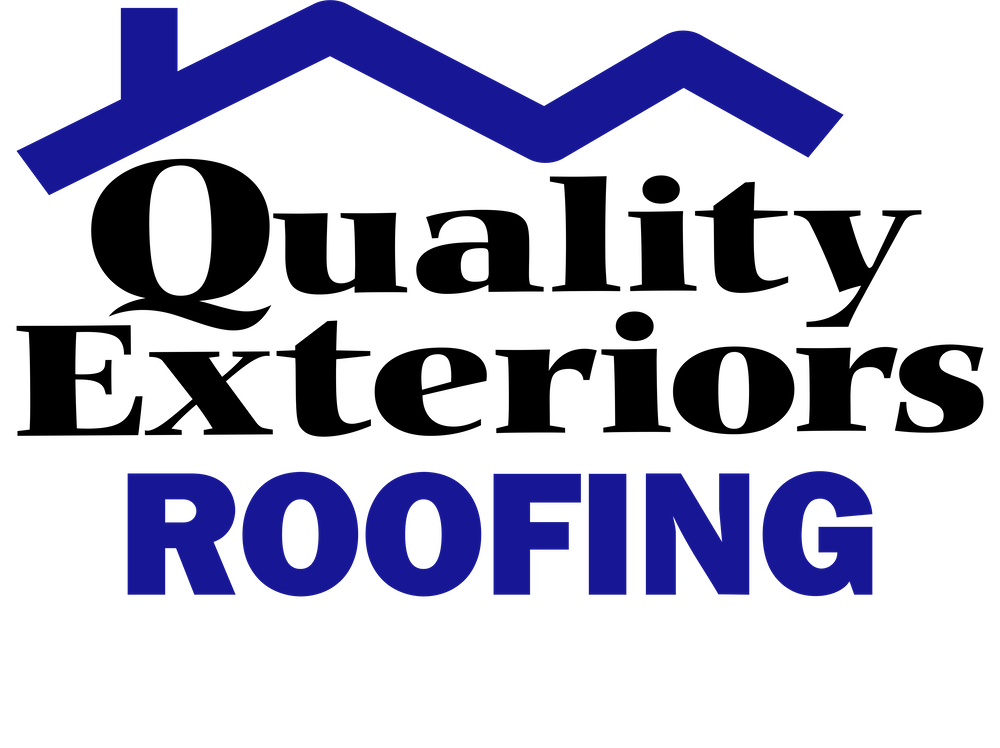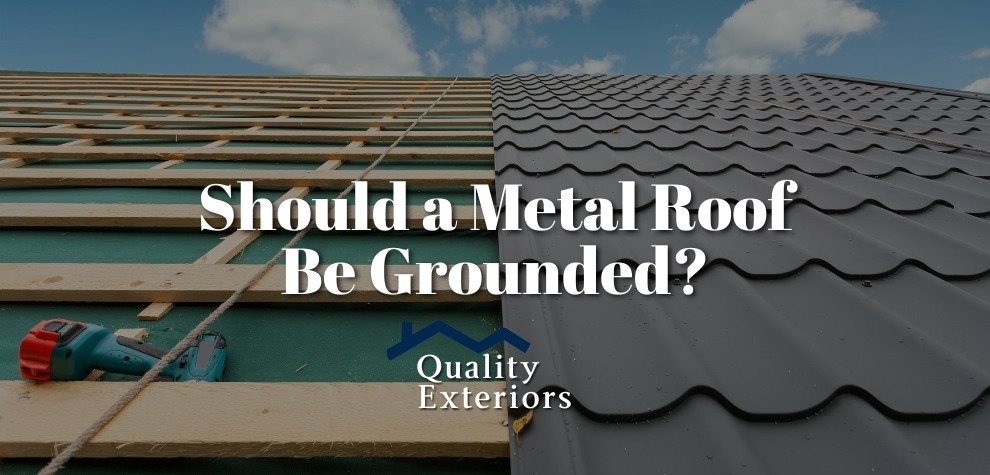Roof and siding contractors can offer a variety of roof covering options to complement practically any home style or aesthetic. For instance, if you seek a weathered, rustic effect, a wood shake roof style is a fantastic option for you. Meanwhile, multi-colored asphalt shingles will give your house a more classic, Americanized feel. Metal roofing, on the other hand, is a popular material in many disciplines of construction, including home remodeling. Aside from its aesthetic appeal, metal roofing has a number of other benefits that make it a popular choice among modern homeowners. However, if you’re going to utilize metal roofing, it’s important to consider whether it has to be grounded like other metal construction equipment.
In this post, our professional Bossier City roofing contractors at Quality Exteriors will answer your questions regarding metal roofing, including “Should a metal roof be grounded?”
What Does It Mean to Ground a Metal Roof?
Before we answer the question of “should a metal roof be grounded?” we should first explain what it means to ground a metal roof in the first place.
When faced with the option of metal roof installation, many homeowners fear that the material will attract lightning and pose a serious risk of danger. However, there’s no need to worry about installing a metal roof on your home. They’re safe, attractive, and may even outlast you!
When lightning strikes a roof or another surface, grounding provides an alternative path for the rush of energy. Electrical grounding is a method of providing this alternate path for the electrical current in the event of a rapid surge of power, such as when lightning strikes your roof. A series of bare copper wires connected to every metal electrical box throughout the home forms the grounding system in a residential property. This is done in order to diffuse the electrical current.
However, the question remains: should you ground a metal roof?
Does a Metal Roof Need to Be Grounded?
Most reputable residential and commercial roofing installation contractors would agree that grounding a metal roof is not necessary. Metal roofing is safe, and in most cases, you won’t expose yourself to any additional risks if you don’t ground it. Furthermore, there is no rule in the National Fire Protection Association’s Codes and Standards about grounding metal roofs on residential or commercial buildings.
But what about lightning strikes? The answer would still be no. The truth is metal roofs are no more likely than any other roofing material to be struck by lightning. Despite the fact that metal conducts electricity, a fully covered roof may ground a lightning strike through the rest of the structure without inflicting damage to the interior or people inside. In addition, most metal roofs are naturally inflammable, which means you’ll be safe from a fire in the event of a lightning strike.
What matters most is that you install your roof in accordance with local building codes. Failure to comply with this requirement could put the residents of the home in danger. For example, if you use an inadequately grounded metal pipe, it could have the reverse effect and instead move down the pipe into the house, inevitably causing damage.
In short, there’s no need to concern yourself about the “dangers” of metal roofs and lightning, as most common concerns are actually misconceptions. However, you may always ground your roof just to be safe. You might also ask your contractor about grounding metal roofs as a safety measure if there are metal gadgets on a nearby porch or lawn. You may require a grounding wire if you can not relocate these metal fixtures.
Do Metal Roofs Attract Lightning?
Lightning strikes on a metal roof may be a concern of yours, as it is for many others who are thinking about installing metal roofs on their homes. After much research, however, experts established that a metal roof is no more likely to attract lightning than any other roofing material. In fact, a metal roof is thought to be even safer than other choices because of its non-combustible Class A fire-resistance rating. Lightning will strike an item or material that gives the least resistance as a path to the ground. Since a metal roof provides the same path as a standard roof on the same structure, it won’t pose a greater risk of a lightning strike.
When lightning strikes a structure, it runs through the material and down to the earth, passing through the pipes and electrical systems of a home. Lightning can ignite combustible materials on a roof, such as flammable asphalt shingles or wooden shakes. When materials like shingles compared to metal roofs, the metal roofs actually provide more protection due to their fire-resistant rating. As a result, metal roofs are actually the most popular in lightning-prone regions because of their fire safety standards.
Why Should You Ground a Metal Roof?
Let’s start with a look at how lightning works. Many people believe that because a metal roof is, well, made of metal, it will inevitably attract lightning. This is a common misconception. As we mentioned briefly, lightning simply takes the path of least resistance, which is usually the area’s tallest grounded building. A tree in the middle of a field or a tower in a city are some examples.
But what if your house is the highest building in the neighborhood? If this is the case, a metal roofing system will still offer better lightning protection than a wood shake or asphalt shingle roof. If lightning strikes a metal roof, the conductive characteristics of the metal will swiftly dissipate the power to the earth.
In summary, you don’t have to ground your roof in most cases. However, local construction rules may require the grounding of a metal roof depending on the following variables:
- Topography – Large properties with different topographical properties, such as hills and flat plains, may have a higher risk of being struck by lightning.
- Building Size – The higher the structure, the more likely it is to be struck by lightning.
- Proximity to a Taller Structure – A structure that is taller than your home, whether man-made or natural, may reduce the risks of your home being struck by lightning.
- Frequency – If you live in a location where thunderstorms are common, grounding your home may be necessary.
Grounding vs. Not Grounding Roofs
So, based on what we’ve learned, should a metal roof be grounded? The answer is no; unless your local building code specifies otherwise, there is no requirement to ground your metal roof. In most cases, not grounding a metal roof will not pose any additional risks to you or your home. Furthermore, if you wanted to go this route, the average cost to tear off and replace the roof would be much higher.
Let’s recap as to why this is:
- Metal is a well-known electrical conductor, so the concern with metal roofs is that they attract lightning more than traditional roofing systems. However, this belief is incorrect. Metal roofs are no more vulnerable to lightning strikes than other roofing materials.
- Even if struck by lightning, metal roofing is safer due to the fact that a potential fire created by the strike will not spread as quickly due to the metal roof’s inflammable nature. The strike’s electricity will disperse over a broader area, reducing the damage and keeping everyone inside out of danger. Metal building materials, in this situation, prove to be safer than other types of materials, such as typical wood-framed buildings, which are much more prone to catching and spreading fire.
- Some conditions (such as having high, thin points on your metal roof) contribute to lightning strikes. Be sure to check with your metal roof contractor to ensure your roof isn’t prone to lightning strikes.
Need a Roofing Contractor? Contact the Professionals at Quality Exteriors Today!
When it comes to high-quality roofing solutions, Quality Exteriors is the place to go. Our team is more than happy to assist you with all your needs, including metal roof installation, local roof replacement, or simply addressing your concerns regarding roofing materials. We service the Shreveport-Bossier area with all home exterior needs, including but not limited to roofing, siding, and windows. Give us a call at 318-747-1254 today for more information. You can also book your free home or business inspection through our website!

